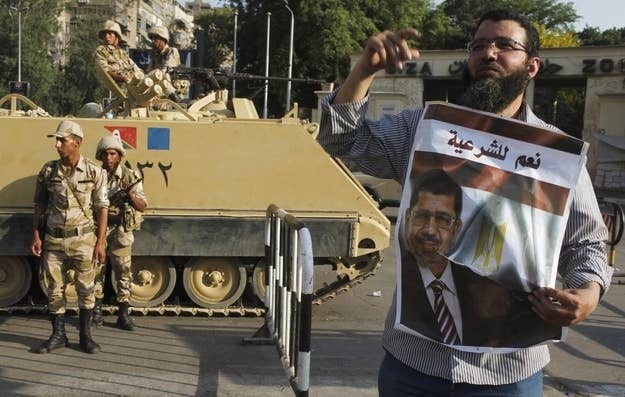
CAIRO — The Muslim Brotherhood official watched a boy wave an Egyptian flag and listened to cars honk celebrating the army's kicking the Islamic movement out of power and jailing its leaders.
The Brother, a mid-level official in the organization that for less than a year ran Egypt's government, looked like anyone in the upscale neighborhood, a man in early middle age wearing polo shirt and slacks, sipping his iced coffee late at night.
He expected his time would soon come. He participates in party committees and has ties to senior leadership. He knew there was a list of 300 leaders wanted for arrest and banned from travel.
The Brother had not reported to work in three days, had sent his wife and child abroad, and was spending most of the time among the safety of the thousands of Brotherhood supporters in Cairo's Nasser City demanding Egypt's first truly democratically-elected president, Muslim Brother Mohammed Morsi, be reinstated.
He was certain state security listened to his phone calls.
"It is not a good feeling when you worry about being arrested every day. This is worse than Mubarak. It's like 1954 when in one night, they arrested 18,000 Brotherhood members," he said.
The 85-year-old political Islamist group has been clandestine for most of its existence, with its leaders regularly jailed. Its members' loyalty is marked and enduring: the Brother told his story to a reporter with the permission of his superiors in the Brotherhood.
The man has made discrete enquiries about getting political asylum abroad.
"I don't want to live in a country where I lose my basic rights," he said. "My only crime is I was against the Mubarak regime."
As the Brother spoke, he glanced at news on his smartphone of an attack on Brothers in the city of Zagazig, north of Cairo. He said gangs were chasing Brotherhood supporters in the street. "There was a massacre tonight," he said.
And he smiled ruefully at the military's ability to bring the organization down.
"They played a dirty game," he said.
As he sipped his coffee, unsure of what would come next, the Brother was most of all defiant. He provided a window into the religious party's mindset in the wake of its stunning humiliation at the hands of the protestors, political opponents and their longtime nemesis in the military.
The Brother did not see any mistakes on the part of the Brotherhood, other than not moving quickly enough against its enemies. "Some members of the Brotherhood favored incremental change over radical change. Morsi was patient and friendly while his enemies aggressively moved against him," the Brother said.
He imagined what could have been if the courts had not blocked the Brotherhood's original candidate for president, Khairat el-Shaiter, from running in the June 2012 election. "He would have been more forceful," the Brother.
He believed Morsi was outplayed by the military's chief, General Abdel Fattah al-Sisi, who dissolved the government and whom Morsi originally thought he could trust.
"Morsi was kind. He was not corrupt and sometimes in politics you are punished if you are a kind man," he said.
Still, the Brother paid tribute to Morsi for not backing down as it became clear the protests held on June 30 would prove his undoing. He claimed in the protests' wake, Morsi refused the army's offers to leave for Turkey or Qatar and "told them do your military coup but I will not surrender."
The Brother quoted an Oliver Stone movie about American football to explain why Morsi refused to back down. "On any given Sunday you may win or lose, but if you lose act like a man," the Brother said. "These are our values."
The Brother knew that a restoration of power to the Brotherhood was not likely to come soon. The party had a secret plan for their followers to disrupt the nation's capital with demonstrations Friday, but he believed it would be a long war for the Brotherhood to get justice. But they could absorb the crackdown by the military.
"This is how we have lived under Mubarak, before Mubarak and under the king," he said. "We can wait a year or two years. Our millions will not fly away. There will be a payback."
